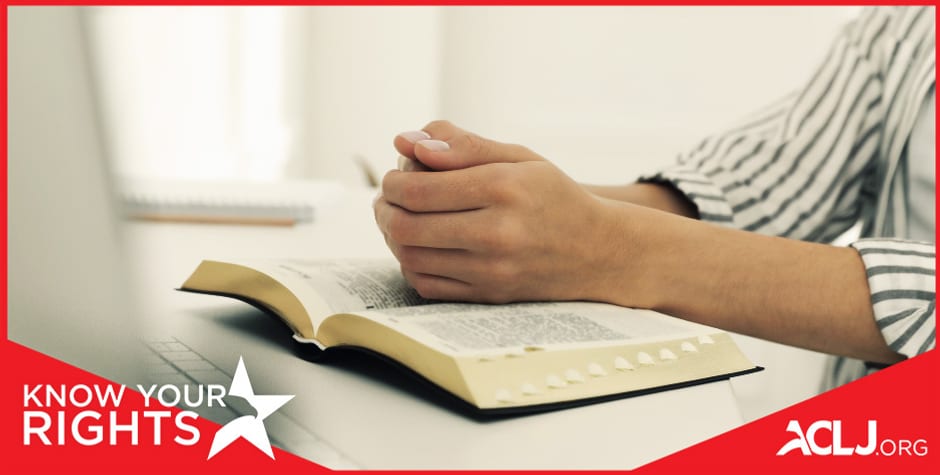Know Your Rights: Employee Religious Liberty Rights in the Workplace
Contrary to what some may believe, individuals do not forfeit their religious freedom when they enter the workplace. Although the facts and circumstances of any particular situation are important to take into account, as a general rule, both federal and state laws protect most employees from religious discrimination in the workplace.
ACLJ attorneys have often defended employees under the federal law, which is Title VII of the Civil Rights Act of 1964, 42 U.S.C. § 2000e et seq., (“Title VII.”). We’ve prepared a legal memo to inform you of some of your rights under this law. Title VII prohibits most employers that have at least 15 employees from, among other things, discriminating in employment based on religion. What that means is that employees may not be treated differently or subjected to harassment because of their religious beliefs or practices. This includes the areas of hiring, firing, compensation, terms, opportunities, conditions, or privileges of employment.
Title VII carves out an exception for certain religious organizations, including religious educational institutions, because the First Amendment Religion Clauses protect their right to hire and retain employees who will further their religious missions. Thus, for example, in most cases, a Catholic school would not be held liable under Title VII for refusing to hire a teacher who rejected Catholic teachings.
In the half century since Title VII was enacted, the law has been very effective in reducing discrimination on the basis of other classifications, such as race and sex, but it has not been as effective at reducing religious discrimination. Threats to religious liberty rights in the workplace have been on the rise. There are many reasons for this, including the growing secularization of American society, the rise in hostility toward some religious beliefs, and the erroneous belief among many government employers that any religious expression in the workplace creates an Establishment Clause violation. But another important reason is that the courts have simply not afforded the level of protection for religious liberty that Congress originally intended when Title VII was passed. How has this come about? It started with a 1977 Supreme Court case that narrowed a key provision of Title VII’s protection for religious liberty.
That key Title VII provision requires employers to grant a reasonable request to accommodate an employee’s sincerely held religious beliefs or practices unless doing so would impose an “undue hardship.” In plain English, that means that an employer must eliminate a conflict between an employee’s sincerely held religious beliefs and a job requirement—and must do so without firing, demoting, or otherwise discriminating against the employee. The only exception is if the employer can demonstrate that accommodating the employee would cause an undue hardship for the employer. In Trans World Airlines v. Hardison, however, the Supreme Court held that “undue hardship” means just a little more than “de minimis.” The dictionary definition of “de minimis” is a “trifle.” The result was that a major international airline company worth millions did not need to accommodate the request of one employee to avoid working on his sabbath. The damage done to employee religious liberty rights by Hardison was enormous.
But thankfully, the Supreme Court recently repudiated Hardison’s clearly wrong definition of undue hardship. In Groff v. DeJoy, a case in which the ACLJ filed multiple amicus briefs, the Supreme Court held that the term “undue hardship” means that “an employer must show that the burden of granting an accommodation would result in substantial increased costs in relation to the conduct of its particular business.” The Court explained further that the determination of undue hardship should be based on a fact-specific inquiry, considering the nature, size, and operating costs of the employer. The impact of a religious accommodation on co-workers is relevant only to the extent that it affects the conduct of the business. Importantly, the Groff Court emphasized that bias or hostility toward a religious practice or accommodation cannot be considered a valid defense for the employer: “An employer who fails to provide an accommodation has a defense only if the hardship is ‘undue,’ and a hardship that is attributable to employee animosity to a particular religion, to religion in general, or to the very notion of accommodating religious practice cannot be considered ‘undue.’”
Groff has significant implications for addressing religious accommodations in the workplace. It reaffirms the protection of religious believers under Title VII and clarifies that employers cannot dismiss accommodation requests based solely on a minimal burden. Instead, employers must demonstrate that the burden of accommodating an employee’s religious practice is substantial.
Groff provides a new rubric for assessing future religious accommodation cases under Title VII, requiring a more nuanced analysis that considers the specific circumstances and impact on the employer’s business. How that rubric will be applied by the lower courts remains to be seen. Learn more about accommodation of religious liberty in the workplace through our full legal memo here.
We are dedicated to defending your constitutional rights. We have been providing assistance and legal representation, at no cost or charge, to people just like you for decades. If your rights are being violated in this area, please contact us at ACLJ.org/HELP.
